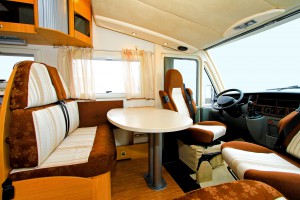
Summer may be winding down, but that doesn’t mean you have to give up your weekend camping trips. With the right preparation, you can still enjoy the beautiful outdoors well into autumn.
Fall camping has its own advantages and disadvantages, but if you plan carefully, you’ll love going outside after summer is over. Learn what to expect and what to do for a successful fall RV camping trip.
The Advantages of Fall Camping
Most people only camp in the summer, if at all, so they miss out on all fall has to offer. In the summer, you have to worry about hordes of mosquitoes, crowds of people and uncomfortably high temperatures. In the fall, you avoid these problems.
If you’re sick of having to reserve a campsite three months in advance, fall is perfect for you. Those who are still willing to come outside when it gets colder will have the outdoors to themselves instead of competing for space with the rest of the population.
Additionally, you get fall’s unique beauty: the changing leaves. Don’t miss the show nature puts on during the transition from summer to winter. You won’t regret your camping trip.
The Disadvantages of Fall Camping
While fall camping is lovely, it isn’t without downsides. If you love to camp primarily for access to water activities, you may be out of luck. Unless you have a wetsuit and nerves of steel, autumn is probably too cold for swimming like you did on your summer camping trips.
The cold can be difficult in other ways too. If you aren’t prepared, your nights may be uncomfortable as the temperatures drop. However, if you prepare carefully, you can stay comfortable in the fall and still enjoy your camping trips.
Tips to Enjoy Your Fall Camping Trip
Follow these tips to make sure you can enjoy fall’s advantages while minimizing the disadvantages.
1. Check the Weather
During the summer, the weather is often fairly predictable: it’s going to be hot, and it’s usually pretty dry. However, during the fall, the weather can be more variable.
Depending on where you are, the daytime temperatures may still be warm enough for shorts and t-shirts—or they may be low enough that you’ll need sweaters. You also need to prepare for the possibility of fall rains. Make sure to check the forecast before you leave so you have an idea of what to expect.
2. Wear Layers
Since fall can be warm during the afternoon but chilly in the mornings and evenings, bring layers that are easy to pull on and off as needed. For example, wear your t-shirt, but bring a light jacket you can put over it when there’s a breeze.
Pack layers for the nighttime too, when the temperatures may drop close to or below freezing. You’ll want gloves, a hat and warm socks.
3. Plan on Warm Meals
When you wake up on a chilly fall morning, you’ll want a hot breakfast to help you warm up. When the temperature drops and your body has to work harder to keep warm, you’ll need hot, filling food. Plan on meals and snack that are rich with protein, carbs and lean fats to give your body the fuel it needs.
Bring a kettle along too—you’ll love sipping hot apple cider, cocoa, tea or coffee during chilly mornings and evenings.
4. Bring Lights
Remember, when summer ends, the days get shorter. Make sure you plan on darker evenings than during the summer. Pack flashlights with extra batteries, and check the lighting systems on your RV.
5. Check Your RV’s Heating System
During the summer, you didn’t need your RV to provide any heat, but fall is different. If you want to stay warm inside your RV, now is the time to check if your RV’s heating system still works. Don’t wait until you get to camp to find out that it needs service.
6. Check Your Tires
Fall means rain and possibly freezing temperatures, which means the roads may be slick. If your RV’s tires are in good shape and are properly inflated, you have a better chance of navigating the roads safely. Check on your tires before you leave.
7. Know How to Protect Your Water Systems
If the outside temperatures at your camp site drop below freezing, know how to drain the water lines to your RV’s tanks. That way, you don’t risk damage to your RV’s water systems during a nighttime freeze. If you’re renting your RV, ask your provider what they recommend.
Fall is a beautiful season that you shouldn’t miss. Don’t stop using your RV now just because summer is almost over. Keep going outdoors, and with the right preparation, you should have just as much fun during the autumn as you did during the summer.
If you’re looking for an RV to buy or rent, or if you need to get your RV serviced, reach out to Fretz RV.
